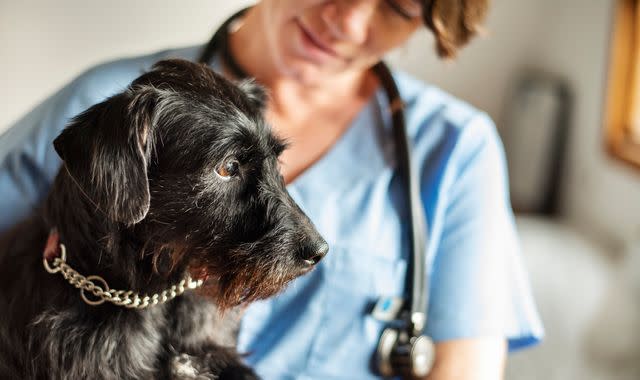Shortage of vets getting worse because of Brexit, MPs warn

MPs have warned about an increasing shortage of vets due to post-Brexit visa and food security requirements.
A scarcity of vets poses a danger to protecting animal and human health, the UK's £4.2m meat, dairy and egg export trade, and guaranteeing animal welfare and food security, according to a letter from Tory MP Sir Robert Goodwill, chair of the environment, food and rural affairs committee.
The letter to Environment, Food and Rural Affairs Secretary Steve Barclay calls for more funding for veterinary degrees, higher salaries for public health vet roles and a reduction in the minimum salary required to obtain a skilled visa for overseas vets.
MPs on the committee spoke to veterinary sector leaders in March and said the shortage of vets has worsened since a reduction of 11.5% in 2018, however, due to a lack of data "we have no clear picture of the scale or nature of the shortages".
They said a shortage is of particular concern as due to Brexit there are more biosecurity measures for animals coming into the UK, food and animal certification has changed and it is harder to recruit vets from overseas.
Vet experts they spoke to were apprehensive about the UK's ability to deal with ongoing or significant disease outbreaks in animals.
Bird flu has been a major issue for poultry farmers over the past few years, while the government warned this week that a new strain of the virus bluetongue could spread to cattle and sheep.
"Responding to such an event would call upon public and private sector vets to suspend business as usual activities due to an absence of domestic standby surge capacity," the letter said.
Skilled Worker visa not available to most vets
The MPs said many vets are leaving the profession due to high stress levels, a poor work-life balance and feeling undervalued.
In 2021, 45% of those who left had only been working as vets for four years or less, while 21% had less than a year in the job.
They said their "most immediate concern" was the new minimum salary threshold of £48,100 for overseas veterinary surgeons coming to the UK on a Skilled Worker visa, which came into force last month.
"This will preclude all but highly experienced professionals from coming to work in the UK," the MPs said.
They suggested a new minimum salary of £38,700 and said the current minimum threshold of £33,670 for those under 26 was welcome but did not apply to many vets as a veterinary degree takes five to six years.
"We remain reliant on recruiting veterinary professionals from overseas," the MPs said as although new vet schools have been launched, they have not graduated yet, and the UK's "needs are significant and urgent".
The shortage has been exacerbated by a "significant reduction" in overseas vets coming to work in the UK, with the number of EU vets in the UK more than halving since Brexit.
More university funding needed
MPs also called for more funding for veterinary degrees as it is the most expensive degree to deliver, costing between £27,000 and £32,000 per student per year.
Universities get £20,000 a year for veterinary students in England and Wales, and £17,500 in Scotland but tuition fees have been frozen since 2017-18, while teaching funding has risen by just 4% - meaning a real-terms reduction of 15 to 30% since 2012-2013.
As a result, universities are increasingly reliant on international student fees, the MPs said, despite high demand for places from UK students.
The MPs also suggested a student debt forgiveness scheme to attract graduates to work in "particularly hard-hit specialisms and regions of the UK", such as rural areas and public health roles.
Public pay must match private
They also said there should be higher salaries for public health veterinarian roles as, although they are matched to private roles when starting, they do not match the pay progression in the private sector, with a £10,000 to £20,000 discrepancy after five years.
Read More:
Tory MP Natalie Elphicke defects to Labour Party
Ex-Tory minister says he would welcome Farage into party
Public health vets are essential for animal and food health. The job can involve food safety, animal welfare, disease outbreak prevention, export certification, research and teaching.
A Defra spokeswoman said: "We value the work of vets and other professionals who work with animals, and we are considering the best way to utilise them to ease the burden on veterinary capacity both now and in the future.
"As part of our efforts, we established a Veterinary Education and Future Capacity Working Group, working with the public and private sector to help reduce workforce shortages and promote a sustainable education system capable of delivering across all sectors of the veterinary profession."

 Yahoo News
Yahoo News 
